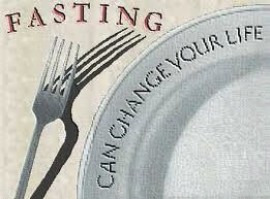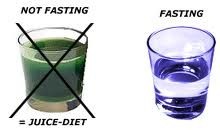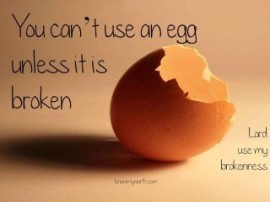Fasting is usually a major missing element in modern Christianity
Then John’s disciples came and asked him, “How is it that we and the Pharisees fast often, but your disciples do not fast?” Jesus answered, “How can the guests of the bridegroom mourn while he is with them? The time will come when the bridegroom will be taken from them; then they will fast." Matthew 9:14-15
"There is no sincerer love than the love of food." -
George Bernard Shaw, the Irish playwright
'THE WHAT AND WHY OF FASTING',
Fasting is the abstention from food for a period of time. Various forms of fasts are possible. First of all, there is what I call the absolute fast. The absolute fast is one in which the person fasting eats no food whatsoever and drinks no water for a certain length of time. Moses underwent two absolute fasts for forty days each. During that time he neither ate food nor drank water. His were supernatural fasts spent in the immediate presence of God. Although I know people who have had absolute fasts of up to fifteen days, I do not advise anyone to go on absolute fasts of more than ninety-six hours. It is risky and I do not think that the risk is necessary.
There is also what we call the complete or total fast. This is the withdrawal from all food and all drink except water. In a complete fast, a person drinks water and water only. No juices, tea, milk, or anything else is allowed. This is most likely what the Lord Jesus underwent for forty days, for we are told that after the fast He was hungry, but we are not told that He was thirsty. I consider this the normal fast--nothing taken in but water.
There is also what may be called the partial fast. There are many forms of this. One common type is to take one meal every
twenty-four hours. The one meal should be light and not the size of three meals, which would be gluttony. Another type of partial fast is to live for some days or weeks only on fruit juice or milk.
Another type of partial fast is the one described by Daniel. He said: "In those days I, Daniel was mourning for three weeks. I ate no delicacies, no meat or wine entered my mouth, nor did I anoint
myself at all, for the full three weeks" (Daniel 10:2,3).
Some brethren have had a partial fast during which they ate only bread and drank only water for a period of three weeks. They were blessed. As we have said, the normal practice is to abstain
completely from food, that is, a complete fast. The spiritual benefits are greater. I have never had an absolute fast of more than seventy-two hours, and so I cannot say much about absolute fasts
from personal experience. I have some experience of long and short complete fasts and of a number of three-week partial fasts. Partial fasts are only recommended for people who have health problems
that prevent them from undergoing complete fasts. A case for partial fasts may be made for people in job situations that make long complete fasts impossible.
A definite advantage of a partial fast of, say, three weeks is that one is strong enough to do the normal duties of life. I remember one time when I had a three-week partial fast during which I had
only bread and tea. I was strong enough to work fifteen to eighteen hours a day on the book I was writing at that time. If your experience of fasting has been limited to partial fasts, then this is
the time to make progress. Stop going on partial fasts and begin to go on complete ones. Maybe you ought to start next week. You may begin with a forty-eight-hour complete fast and two weeks
afterwards go on a seventy-two-hour complete fast. You will see the impact of that fasting on your spiritual life and be glad.
There was a time during which I backslid in my fasting life. I stopped complete fasts and only took to partial fasts. I gave the excuse that it was because I was too busy with other aspects of the
ministry. When I realized that I had backslidden, I repented and decided to go back to normal fasting. It was difficult. I even found a seventy-two-hour complete fast very difficult, and a couple of
times I broke a fast that I intended to go on for seventy-two hours after only forty-two hours. I cried to the Lord for mercy and help. He heard my prayer and healed my backsliding. I was then able
to fast normally again.
Fasting is not only abstention from food. It is concentration on the Lord, His holiness, His Kingdom, and His will. Normally, when a person is full of food, the desires of the physical body are very
strong as well as the desires of the soul--that is, the will, the mind and the emotions. During fasting the desires of the body are greatly reduced and the spirit rises and soars, controlling the
soul.
This means that spiritual reality is more easily discerned by a fasting person than by one who is not fasting. At the height of a long fast, which may be between the twenty-fifth and the fortieth day, the things of this world become absolutely meaningless. For example, I found that the following were absolutely meaningless to me during such a period: my looks, my educational qualifications, my job, money, clothes, property, the presence of human beings (in fact, each one had a detestable odor), any accomplishment in the world, etc.
On the other hand, God was near and thoughts of heaven possessed me. I was anxious to walk in perfect holiness. I wanted to obey the Lord in everything. I wanted His companionship. I wanted to hear His voice. Although I did not have much strength to pray, I felt that I was in direct communion with my God and my short prayers that were uttered as short phrases throughout the day and night seemed to go right to the heart of God. As I read the Word, God seemed to speak more clearly and spiritual illumination was received readily.
The Power of Fasting
God promises marvelous rewards for those who engage in the discipline of fasting. Fasting was practiced by the great heroes of faith, and it is just as relevant today as it was when Jesus urged His disciples to adopt this personal discipline. (See Matthew 6:18.)
The Benefits of Fasting
- Our Health Will Be Restored Quickly. During an extended fast, toxins in the body are eliminated, and our immune system is strengthened. This eliminates a variety of diseases. God promises those who fast, ". . . thy light shall break forth as the morning, and thine health shall spring forth speedily ..." (Isaiah 58:8).
- Our Understanding Will Be Increase. Fasting enables us to focus on a particular problem or crisis, giving us direction and allowing us to see the "bigger picture." When Nehemiah learned about the deplorable condition of his people in Jerusalem, he fasted for several days. It was during this fast that God gave him understanding concerning the rebuilding of Jerusalem's walls, resulting in prosperity to the people through a restoration of their city. (See Nehemiah 1:4.)
- Our Spirit Will Be Strengthened. Paul explains that, ". . . the flesh lusteth against the Spirit, and the Spirit against the flesh: and these are contrary the one to the other . . ." (Galatians 5:17). By denying our fleshly appetites, we are able to experience a strengthening of our spirit's power by the power of the Holy Spirit. Jesus went into the wilderness filled with the Spirit, but after forty days of fasting He, ". . . returned in the power of the Spirit . . ." (Luke 4:14).
- Our Addictions will be Overcome. Sexual desires are greatly diminished during a fast, giving us a greater ability to overcome sexual temptations because our spiritual lives are strengthened. When the disciples were unsuccessful in casting out the demonic spirits in a young boy, they asked Jesus why. He explained, ". . . this kind goeth not out but by prayer and fasting" (Matthew 17:21).
- Our Life Expectancy Will Be Lengthened. Many people assume that our life span is 70 years. For this, they cite Psalm 90:10. However, the context of this verse explains that, because of God’s wrath and judgement, the years of our life are only 70 or 80. One who regularly fasts is likely to live much longer. Many significant studies have revealed a dramatic increase in longevity among animals who have undergone intermittent fasting.
What Is a Fast?
A fast is setting aside all food and liquids (except water) for a period of time. If a person is under a doctor’s care or is taking medication, the doctor should be consulted before a fast is begun. How Long Should a Fast be? A fast can vary from one meal to forty days. The nation of Israel turned defeat into victory by fasting only one day. (See Judges 20:26.) Ezra received direction and protection from the Lord after several days of fasting. (See Ezra 8:21-23.) Daniel got a direct answer from God after 21 days of fasting, and Moses received the Ten Commandments during a forty day fast. (See Daniel 9; Deuteronomy 9:9.)
What Will Happen During a Fast?
During a longer fast, the temporal cares of this world will fade into insignifigance and the realities of eternity will become much clearer, especially as we combine fasting with other spiritual exercises. Time will seem like it is slowing down during a fast, and we will tend to think about food. Therefore, it is important to have a variety of meaningful activities to do, such as: reading large sections of Scripture, memorizing verses that stand out, reading biographies of the great heroes of faith, learning and singing classic hymns, writing out insights, or working on booklet or paper. On the physical level, expect hunger as the stomach shrinks in size and sends signals to the brain to "fill me up." These are not starvation pains, unless the fast goes too long. Toxins will be eliminated from our body and will form a thick white coating on our tongue which may cause bad breath. Also, there will be physical weakness and a greater need for sleep. David testifies, "My knees are weak through fasting; and my flesh faileth of fatness" (Psalm 109:24).
What Does Medical Literature Say About Fasting?
Most Doctors today have not received training on the procedures and benefits of fasting. Among the medical literature on the subject, many papers do not actually explain the results of a complete fast, but rather, from "portion fasts" which do not bring the same results.
Article from http://lifepurposehealth.com/index.php/disciplines/the_power_of_fasting/
Fasting for Health
Posted By Dr. Ben Kim
Historical records tell us that fasting has been used for health recovery for thousands of years. Hippocrates, Socrates, and Plato all recommended fasting for health recovery. The Bible tells us that Moses and Jesus fasted for 40 days for spiritual renewal. Mahatma Gandhi fasted for 21 days to promote respect and compassion between people with different religions.
For much of human history, fasting has been guided by intuition and spiritual purpose. Today, our understanding of human physiology confirms the powerful healing effects of fasting. Fasting is a powerful therapeutic process that can help people recover from mild to severe health conditions. Some of the most common ones are high blood pressure, asthma, allergies, chronic headaches, inflammatory bowel disease (ulcerative colitis and Crohn’s disease), irritable bowel syndrome, adult onset diabetes, heart disease, degenerative arthritis, rheumatoid arthritis, psoriasis, eczema, acne, uterine fibroids, benign tumours, and systemic lupus erythematosus.
Fasting provides a period of concentrated physiological rest during which time the body can devote its self-healing mechanisms to repairing and strengthening damaged organs. The process of fasting also allows the body to cleanse cells of accumulated toxins and waste products.
Fasting gives the digestive tract time to completely rest and strengthen its mucosal lining. A healthy intestinal mucosal lining is necessary for preventing the leakage of incompletely digested proteins into the bloodstream, thereby offering protection against autoimmune conditions. A healthy digestive tract also helps to protect the blood and inner organs against a variety of environmental and metabolic toxins.
A fast that is appropriate for your situation will allow for you to experience some or all of the following:
•More energy
•Healthier skin
•Healthier teeth and gums
•Better quality sleep
•A clean and healthy cardiovascular system
•A decrease in anxiety and tension
•Dramatic reduction or complete elimination of aches and pains in muscles and joints
•Decrease or elimination of headaches
•Stabilization of blood pressure
•Stronger and more efficient digestion
•Stabilization of bowel movements
•Loss of excess weight
•Elimination of stored toxins
•Improvement with a wide variety of chronic degenerative health conditions, including autoimmune disorders
It is important to understand that the detoxifying and healing processes that occur during a fast are also active when a person is consuming food. A fast can be helpful for people whose conditions are not improving as quickly as they would like, or for people who have health conditions that require a concentrated period of healing to resolve. It is also important to understand that the most important part of a fast is how a person lives after the fast. Fasting can provide a clean and revitalized foundation upon which you can build and maintain a strong and well-conditioned body by consistently making healthy food and lifestyle choices.
What follows are answers to commonly asked questions about fasting:
Q. How do I know if I need to fast?
A: The answer to this question depends on your health status and goals. For many people, adopting an unprocessed, whole food diet, engaging in a sensible exercise program, acquiring restful sleep, and living in a relatively unpolluted environment will provide the necessary conditions to recover and maintain vibrant health. If a person is having a difficult time making necessary dietary and lifestyle changes, fasting can be a powerful way of accelerating health recovery. Fasting can also reset the sensitivity of the nervous system, providing an effective way of overcoming dependencies on caffeine, nicotine, alcohol, other recreational drugs, salt, sugar, and other stimulants. After fasting, many people marvel at how sweet romaine lettuce is, how refreshing apples are, and how wonderfully delicious baked potatoes are – without sour cream and butter! Many of us have been eating rich, salty, and sweetened foods for so long that we are unaware of how good foods taste in their natural, unprocessed states.
Some people choose to fast in the absence of overt symptoms of disease, knowing that a period of complete physiological rest can allow the body to rejuvenate itself from the toxins that build up in our tissues despite our efforts to live healthfully.
Q. How long should I fast for?
A. If you choose to fast to recover from acute illness, you can fast until you feel well enough to eat again. In the case of a chronic health challenge, the length of the fast is determined by the progress of the fast. The healing processes that take place during a fast are predictable. Blood levels of cholesterol and uric acid tend to elevate during a fast, a result of the body stirring up stores of undesirable materials and expelling them into the circulation to be eliminated from the body. Shortly after the fast, these levels tend to be lower than they were before the fast, indicating a cleaner system. ESR, a marker for inflammation, tends to decrease during the course of a fast.
As a part of the detoxification process, some people experience vomiting, diarrhea, headaches, dizziness, skin rashes, and other uncomfortable symptoms. Fasting under the supervision of a health care professional who is trained to distinguish healing responses from harmful processes can be helpful in allowing a person to "ride out" uncomfortable symptoms of detoxification. It is not uncommon for people to experience significant improvement in their health from fasting between 3 and 30 days. The idea is to fast as briefly as possible, but as long as is necessary to allow the body to restore health.
Q. Can anyone fast?
A. There are a handful of exceptional circumstances in which it is not advisable to fast. A small portion of the population has an inborn error of metabolism whereby they lack an enzyme that is needed to process fatty acids. Since fatty acids are needed as an alternate source of energy during a fast, it would not be safe for such a person to pursue a fast of significant duration. This disorder can be recognized early in the fasting process by a trained observer.
Intake of certain medications, certain liver and kidney disorders, states of extreme weakness or malnutrition, pregnancy, and certain types and stages of cancer are other examples of conditions that are not conducive to fasting.
Q. Can fasting cure specific conditions?
A: It's important to keep in mind that fasting is not a cure for specific health challenges. Rather, it is an opportunity to give the body a prolonged period of rest to do what it does best – heal and restore itself. The same healing mechanisms that are at work during a fast are also at work while a person is eating. The difference is that during a fast, all of the body's resources are channeled towards its self-healing and restorative mechanisms.
Conditions that tend to respond favourably to fasting and dietary modification include high blood pressure, asthma, allergies, chronic headaches, inflammatory bowel disease (ulcerative colitis and Crohn’s disease), irritable bowel syndrome, adult onset diabetes, heart disease, degenerative arthritis, rheumatoid arthritis, psoriasis, eczema, acne, uterine fibroids, benign tumours, and systemic lupus erythematosus.
Q. How much weight will I lose if I fast?
A. On average, a typical faster loses approximately one pound per day during a water-only fast. Initially, the loss may approach two or even three pounds per day for the first few days if the person is retaining significant sodium and water. This can decrease to approximately half a pound per day in the later stages of a fast. From day two onward, the body begins utilizing fatty tissues for energy, thereby conserving as much muscle tissue as possible, a mechanism called protein sparing.
Q. What is the difference between water fasting and juice fasting?
A. During a water fast, only water is consumed. During a juice fast, any variety of fruit and vegetable juices are consumed. People detoxify and heal more quickly with a water fast than with a juice fast. This is because with a water fast, your digestive passageway and organs are able to rest completely, allowing for all of your energy to be used for cleansing and repair of damaged tissues. With a juice fast or a cleansing diet of fruits and vegetables, your body must use energy to digest nutrients, leaving less available energy for detoxification and healing. When a person's health condition is related to a weak or damaged digestive system, recovery may depend on fully resting the digestive passageway and organs through water fasting.
Another significant difference is that more fat tissue is burned during a water fast, as your body must rely exclusively on fat reserves to supply its energy needs after the first 1-3 days of water fasting. Your body stores the bulk of incoming toxins in your fat reserves. As these reserves are burned for energy during a fast, any stored toxins will be released into your circulation, to be eliminated through various eliminative channels like your urine and respiratory tract. This mechanism of detoxification also occurs with juice fasting, but at a slower pace.
All of this considered, both types of fasting can be used with effectiveness, depending on your circumstances and goals. If your situation and goals include wanting or needing to make significant gains in your health in a short period of time, water fasting may be the best route. If a person has a long history of taking extremely toxic drugs like certain chemotherapeutic agents, an intense period of detoxification through water fasting can cause damage to the kidneys. In this type of circumstance, juice fasting or a simple diet of organic vegetables and fruits may be the best first step to recovery.
Finally, a water fast is most effective when you are able to get a lot of physical and emotional rest. If your life circumstances don't allow this, juice fasting is a better choice.
Q. Won't my metabolism slow down during and after the fast, causing me to gain back more weight over the long haul?
A. Metabolic rate fluctuates according to our moment-to-moment physiological needs. When we are active, our metabolic rate speeds up. When we sleep, our metabolic rate slows down. In the same way, when we fast, our metabolic rate slows down because our physiological needs are lower than they are when we are consuming food and going about our regular activities. When a fast is broken and a person returns to eating and more activity, her metabolic rate increases to match her increasing physiological needs.
What does change during a fast is our digestive and assimilative capacity. Fasting provides an opportunity for our digestive organs to heal and make more efficient use of the nutrients in the foods that we consume. Weight gain or loss is always a simple function of how many calories we take in versus how many we expend. If your primary goal is to be at a healthful weight for your unique disposition, the optimal approach is usually to combine an unprocessed, whole food diet with a regular aerobic exercise and strength-training program.
Long water only fast for type 1 diabetes is very effective
Type I diabetes, Mellitus by definition, is the result of the destruction of the Beta-cells in the Islets of the pancreas. These cells \"measure\" blood sugar and secrete Insulin
accordingly. Insulin then \"drives\" the \"insulin receptors\" on our other cells.. these are little \"pumps\" that move blood sugar from the
surroundings into the cells. The word Insulin is derived from Islets.. small \"islands\" of Beta-cells scattered among the pancreas tissues.
Thus, according to the strict definition of Type I DM, it is incurable. We cannot produce new Beta cells. At least this has never been demonstrated. However, I have witnessed on the odd occasion Type
I DM reversing during a longish fast. This was however almost exclusively very shortly after the diagnosis. The islet cells were therefore not totally dead yet, only damaged and therefore unable to
produce insulin. During a fast we do not need insulin, as most of the body runs on Ketones, and the bit of sugar that is formed from fat, can be consumed by the heart and the brain, the two organs
capable of ingesting blood sugar without the aid of insulin. Theoretically during this \"holiday\" for the Beta-cells, they may repair themselves before they die.. but then we have
to address the original \"cause\" of their being damaged.
Thus:
1. I try to prolong this; by administering Insulin at full replacement dosages for a few days, even weeks, after the patient has started eating.
2. I always suggest a purely vegan diet afterwards. This is because animal products might contain proteins similar to those on the beta cells, which could have triggered the immune response
originally responsible for the damage.
NOW I SAY, PLEASE NOTICE IN THE ABOVE ARTICLE, IN A WATER ONLY FAST THE BODY DOES NOT NEED INSULIN, IT RUNS ON KETONES... IF MORE OF US WOULD FAST MORE OFTEN AND NOT BE AFRAID TO GO ON A 1, 2, OR 3 WEEK FAST WE WOULD SEE ALOT MORE PEOPLE HEALED OF THEIR DISEASES! OF COURSE THE BIGGEST DANGER IS IN PEOPLE BREAKING THEIR FAST WRONG, TOO FAST, OR ON THE WRONG THINGS.. YOU MUST BREAK A LONG WATER ONLY FAST PROPERLYAND YOUR BODY CAN HEAL ITSELF OF ALMOST ANYTHING, WITH GOD'S BLESSING -TH
Intermittent fasting may hold the key to longevity
Article from Natural News by Linn Cole
October 09, 2012
In a culture that feasts 21 times a week, fasting is almost a heretical idea. Yet amidst escalating rates of heart disease, obesity, diabetes and cancer, emerging research on animals and humans suggests that planned, regular fasting may decide whether your twilight years are long and healthy or cut short.
The crux of the issue is surprisingly simple: insulin-like growth factor, or IGF-1, levels of which largely determine the rate at which the body ages.
IGF-1 and age-related disease
Insulin-like growth factor is produced in the liver and released according to activity of Human Growth Hormone (HGH), produced in the pituitary gland. Levels of both naturally decline with age, which is desirable: high levels of IGF-1 encourage the body to focus on producing new cells rather than existing repairing ones. As cellular and DNA damage continues to go unchecked, aging and disease take hold. What's more, cancerous cells usually mutate to take advantage of both insulin and IGF-1, using them as fuel. The reverse is also true: in mice genetically engineered to have low levels of IGF-1, lifespan increases to the human equivalent of 120 years, and among the few hundred people worldwide with low IGF-1, cancer and diabetes are virtually unknown.
Fasting's impacts on IGF-1 and other disease markers
In the recent BBC documentary "Eat, Fast and Live Longer," Michael Mosley fasted for three days and four nights. The result? Halved levels of IGF-1, slashing his risk for age-related disease. His blood glucose levels also fell, indicating improved sensitivity to insulin and lessened risk of developing diabetes. As is typical, after returning to his normal diet Mosley's IGF-1 levels rose to what they were before. To maintain lower levels of the hormone, Mosley adopted the practice of intermittent fasting, taking up what is known as the 5:2 diet. Followers of the 5:2 diet eat whatever they want five days a week and about 500 calories twice a week. Amazingly, following this simple formula is known to lower blood pressure, HDL cholesterol and blood lipids and sustain weight loss no matter what kind of food is consumed. After five weeks on the diet, Mosley lost almost 15 pounds. Additional promising research on mice suggests that intermittent fasting protects against mental illnesses including Alzheimer's, Parkinson's and dementia.
Two simpler dietary interventions also promise some dampening of IGF-1: lowering protein intake, which for most people is higher than is optimal, and refraining from milk. Hormone-rich milk contains an abundance of IGF-1 and is known to contribute to the risk of cancer, particularly fatal prostate cancer
"When I wept and humbled my soul with fasting, it became my reproach. When I made sackcloth my clothing, I became byword to them. I am the talk of those who sit in the gate, and the drunkards make songs about me. But as for me, my prayer is to you, O LORD. At an acceptable time, O God, in the abundance of your steadfast love answer me in your saving faithfulness. Deliver me from sinking inthe mire; let me be delivered from my enemies and fromthe deep waters. Let not the flood sweep over me, or the deep swallow me up, or the pit close its mouth over me. Answer me, O LORD, for your steadfast love is good; according to your abundant mercy, turn to me." Ps. 69:10-20










